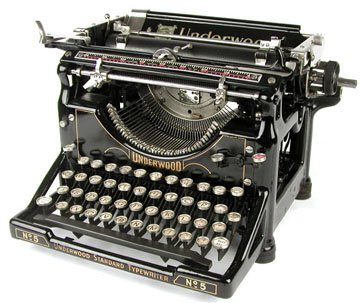My father liked to tinker, especially with his ART-15 Ham radio. He kept that old WWII Army issue radio-transmitter until he could no longer find the vacuum tubes to keep it alive. Even then he may have cheated a bit and redesigned the circuits to include transistors. I never took up that interest, but my brother was certainly influenced by our father's passion for electronics.
Dad was also a scavenger. It was one way to keep that old black metal box squawking and beeping until the wee hours of the morning. I know, because my brother and I shared our bedroom with it.
His scavenging included city and county dumps. Our occasional trips to Las Vegas to visit my grandmother (his mother) often meant we raided the city landfill. He typically looked for discarded electronics, but sometimes his eye would catch a memory. His face lit up on those days. My brother and I went with him on one memorable occasion when he happened upon an old typewriter.
 The old Underwood No. 5, a staple in many offices of the day, had a broken bar around the keyboard. He cleared away the debris and tested the keys and carriage. It worked--sort of. He took it home, cleaned it, oiled it and tinkered until it's key's clacked on paper and the carriage dinged on cue. Then he went to work writing letters and reports for his work. He was a hunt-and-peck typist and a professor of gutter linguistics. For every mistake he made he taught me new words and phrases. That's when my mother began to type his reports.
The old Underwood No. 5, a staple in many offices of the day, had a broken bar around the keyboard. He cleared away the debris and tested the keys and carriage. It worked--sort of. He took it home, cleaned it, oiled it and tinkered until it's key's clacked on paper and the carriage dinged on cue. Then he went to work writing letters and reports for his work. He was a hunt-and-peck typist and a professor of gutter linguistics. For every mistake he made he taught me new words and phrases. That's when my mother began to type his reports.The years passed and that rugged old typewriter saw a lot of use. And a lot of cussing. The darn thing jammed up a lot if you typed too fast. Tangled keys could be a monumental task which invited Dad's linguistic clarity. The keys on the keyboard were too far apart for a kid like myself. If I missed a key my finger would get caught between them and sometimes get scraped. The ink ribbon would snag on the feed-guide and stop. Whining and weeping often followed.
Despite the frustrations I thought No. 5 was a marvelous thing and fun to use. At the time it was a grown-up toy for me. I could act like my Dad and still be a kid--except for the cussing. I used it mostly for homework assignments, but there were times I wrote stories for my mother. She took them to her ladies groups and read them. The stories must have been OK, because she kept asking for more. That was the first stage in my writing career.
Unfortunately the bulb of creative inspiration never lit up and that career turned so I could support my new family. Governmentese became my language of choice. There is a certain amount of creativity in it, but it ends up boring, barnacled and slug-slow. No one writes a best seller in that genre.
How times have changed. Old No. 5 has long gone. There are no ribbons to change or keys to untangle. No "ding" to signal a carriage return and no cussing because of a mistake. The cussing still exists, but for very different reasons.
Then one day, almost 4 years ago, my son said, "Dad, write a book." The bulb of inspiration finally lit. It may not be the brightest bulb in the litany of literary giants, or even runts, and I don't care. I'm having fun.
I may have been about 10 years old when Dad rescued that beat up old Underwood typewriter. I have no idea why his face lit up that day, but after he died many years later, I discovered some old letters he had written. Some were typed.
I can totally see where you got the whole "tinker" thing! Did I connect the right dots?
ReplyDeleteYes, in part. Besides my father innate curiosity the idea for tinkers as the protagonists came from another fantasy series. At the moment I can't recall if it was from Terry Goodkind's "Sword of Truth", or Robert Jordan's "Wheel of Time". In any case, some tinkers play an incidental role in helping the hero with some valuable information. It struck me as a good occupation in which to hide something . . . something magical.
Delete